Cats, with their inscrutable antics and behavior, never cease to bewilder their human companions. One such peculiar behavior, often leaving cat owners perplexed, is their propensity to meow in the bathroom. This perplexing habit invites a myriad of questions – what are they trying to communicate? Is it a sign of distress, or is it simply another quirk in their feline repertoire? In this article, we’ll delve into the possible reasons behind this seemingly odd behavior, providing insights to better understand our feline friends.
Reasons Why Does My Cat Meow in the Bathroom
One potential reason is the bathroom’s acoustics. Bathrooms typically have hard surfaces such as tiles and mirrors which cause sounds to echo. Cats may find these acoustics appealing or intriguing, leading them to meow more in this environment.
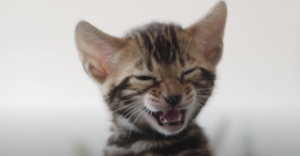
Another factor could be the attraction to running water. Some cats are fascinated by water and the sounds it makes. If your cat sees you turning on the tap or flushing the toilet, it might be trying to replicate that sound.
Lastly, cats may associate the bathroom with attention. If your cat notices that you spend time in the bathroom daily, it might start meowing there to seek your attention. Remember, in the cat’s mind, any attention is good attention!
Cat Sleeps in Bathroom at Night
Just as with their fondness for meowing in the bathroom, cats may also have unique reasons for choosing to sleep there at night. Various factors could be at play.
One potential reason is the temperature. Bathrooms generally have cooler tiles that your cat might find comforting, especially during warmer months. Cats seek cool surfaces to regulate their body temperature.
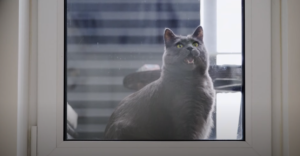
Another reason could be the seclusion and quiet that a bathroom provides. Cats are solitary creatures by nature and may view the bathroom as a safe, quiet space away from household noise and activity.
Finally, it might be a matter of routine or habit. If your cat is accustomed to getting attention or treats in the bathroom, it may have come to associate this space with positive experiences and choose to sleep there. [1]
Sick Cat Sleeping in Bathtub
If your sick cat has suddenly taken to sleeping in the bathtub, it may be a sign that your feline friend is seeking comfort in an isolated and cool spot, especially when running a fever. The slick, cool surface of the bathtub can provide a soothing effect to their body. However, it’s also crucial to note that cats might instinctively hide when they are not feeling well, so if your cat is isolating itself in the bathtub, it could be an attempt to find a secluded spot to recuperate.
Locking Cat in Bathroom at Night- Is It OK?
Locking a cat in the bathroom at night is a topic of contention among pet owners. On one hand, it can seem like a practical solution, especially for new pet owners who are trying to establish boundaries or for cats that might be disruptive during the night. Bathrooms are easy to clean and safe from potential hazards, which can be particularly useful for kittens or newly adopted cats who are still getting familiar with their new environment.

On the other hand, cats are naturally nocturnal creatures and locking them in a confined space could lead to frustration and anxiety, potentially causing behavioral issues. Cats need freedom to explore and exercise, and they might feel distressed if they are confined to a small space for a prolonged period. [2]
How to Stop a Cat Meowing in the Bathroom
If your cat’s bathroom meowing is something you’d like to minimize or stop, there are several strategies you can employ.
Firstly, try to identify any patterns or triggers. Does your cat meow when the tap is running, or when it’s alone? Once you’ve identified potential triggers, you can work on addressing them. For instance, if your cat meows when it’s alone in the bathroom, try leaving the door open so it doesn’t feel isolated.

Secondly, if your cat is meowing for attention, ensure it gets plenty of interaction throughout the day. Play with your cat regularly, and consider adding more toys and enrichment activities to its routine.
Thirdly, if the meowing occurs at specific times, such as when you’re using the bathroom, consider using a distraction. This could be a toy, a treat, or even a second litter box located outside the bathroom.
Finally, remember to reward silence. If your cat is quiet in the bathroom, reinforce this behavior with praise or a small treat.
Cat Sitting on Toilet
Cats sitting on toilets can be quite a peculiar sight for many pet owners. This behavior can be attributed to several factors.
Additionally, some cats might associate the bathroom or toilet with attention. If they’ve noticed you spend a lot of time there, they might sit on the toilet to seek your attention or join you. Lastly, cats can be trained to use human toilets, so if a cat frequently sits on the toilet, it might be attempting to do so. [3]
Why Does My Cat Sit at My Feet When I’m On the Toilet?
Cats sitting at your feet when you’re on the toilet iOne of the primary reasons is because cats perceive bathroom time as an opportunity for uninterrupted attention. s a common behavior that many pet owners notice. There are several reasons why your cat may do this. While you’re on the toilet, you’re not moving around and can potentially give them your undivided attention. Another reason could be that cats feel protected when their owners are stationary. When you’re on the toilet, you’re not likely to step on them or make sudden movements, making it a safe place for them to sit. Furthermore, cats are known for their curiosity; the sounds, smells, and activity in the bathroom can be very intriguing to them. If your cat sits at your feet in the bathroom, it’s likely just a sign of their curiosity and affection for you.
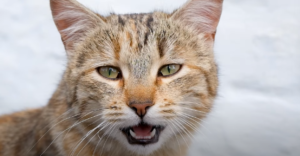
Why Does My Cat Sit in The Shower After I Shower?
Cats sitting in the shower after you’ve showered can seem quite an odd behavior, but it’s not uncommon. One of the primary reasons could be the warm, damp environment that the shower provides. Cats are known to be attracted to warm spots, and the residual heat from the hot water can make the shower floor enticing to them. Additionally, the steamy environment could also stimulate their sense of smell. Cats have a highly developed olfactory system and the different scents left in the shower could be intriguing to them. Another reason could be the running water. Some cats are fascinated by water and its movement, and the dripping faucet or showerhead could captivate them. Lastly, this could be another way to seek attention. If your cat notices that you spend time in the shower, it might sit there to be close to you or to initiate play. [4]
FAQ
How do I get my cat to stop meowing at the bathroom door?
To get your cat to stop meowing at the bathroom door, it’s essential to understand the reason for this behavior. If your cat meows due to separation anxiety, try gradually increasing the time your cat spends alone. Start with short intervals and gradually increase the duration, rewarding your cat for staying calm. If your cat is meowing due to boredom, ensure that it has plenty of toys and stimuli to keep it entertained. Puzzle feeders, interactive toys, and regular playtime can help. If your cat meows because it associates the bathroom with attention or food, try to create new associations. Feed or play with your cat in different areas of the house, not just near the bathroom.
Why does my kitten meow while pooping?
It’s not uncommon for kittens to meow while pooping, and there could be several reasons for this behavior. One possible reason is discomfort or pain. If the kitten is constipated, has diarrhea, or is experiencing any form of digestive distress, it may meow as a way to express discomfort. Another reason could be fear or insecurity, especially if the kitten is new to your home and is not yet accustomed to its surroundings. Kittens might also vocalize while pooping as a way of calling for their mother, especially if they are very young. However, if your kitten consistently meows while pooping, or if the meowing is accompanied by other signs of distress such as loss of appetite, lethargy, or changes in behavior, it’s essential to consult with a vet.
Why does my cat get upset when I close bathroom door?
Cats may get upset when you close the bathroom door due to several reasons. First and foremost, cats are naturally curious creatures, and they might be intrigued by what you could be doing on the other side of the door. The bathroom door being closed could be perceived as a barrier to their exploration. Secondly, many cats develop a strong attachment to their owners and desire to be close to them at all times. Being separated, even briefly, may cause them distress. Thirdly, cats are creatures of habit. If your cat is used to following you into the bathroom, it might be upset by a sudden change in routine. Lastly, closure of the bathroom door may make your cat feel trapped or confined. Even though they are inside the house, the closed door might trigger anxiety in some cats.
What does separation anxiety look like in cats?
Separation anxiety in cats can manifest in a variety of ways, and it’s important to recognize the signs to ensure your feline friend is not suffering unnecessarily. Some common symptoms include excessive meowing, yowling, or pacing when you’re about to leave. Your cat may become more clingy and demand more attention than usual. In some cases, cats with separation anxiety may demonstrate destructive behavior, such as scratching furniture or knocking items over. Changes in eating habits, such as loss of appetite or overeating, can also be a sign. Some cats may exhibit changes in their toilet behavior, such as urinating or defecating outside the litter box. If your cat starts grooming excessively, to the point of causing bald spots or skin sores, this could also be a sign of separation anxiety.
Should I ignore my cat meowing at night?
Ignoring your cat’s meowing at night entirely may not always be the best approach. Cats might meow for various reasons including hunger, loneliness, or because they are in distress. It’s important to first understand the cause of the meowing. If your cat is simply seeking your attention or is used to getting fed at night, gradually changing their feeding schedule and ensuring they have enough stimulation during the day to tire them out can help manage the issue. However, if your cat’s nighttime meowing is a new behavior or if it’s accompanied by other signs of distress or changes in behavior, it may be a sign of a medical issue. In such cases, it’s important not to ignore the meowing and seek veterinary advice. It’s crucial to ensure that you’re not overlooking any potential health issues that may require attention.
Why does my cat meow and scratch at the bathroom door?
Cats may meow and scratch at the bathroom door for a variety of reasons. The first and most common reason is curiosity. Cats are naturally inquisitive creatures and may be intrigued about what is happening behind the closed door. This behavior could also be a sign of separation anxiety, especially if your cat tends to follow you around the house. A closed door between you and your cat may trigger feelings of anxiety, resulting in meowing and scratching at the door. Another possible reason is that your cat may associate the bathroom with positive experiences, such as getting attention or treats. In this case, your cat may be trying to recreate these positive experiences by trying to get into the bathroom. Environmental factors could also play a role. For instance, your cat might be attracted by the smell of fresh water from the tap or the cozy warmth of a heated bathroom.
Does my cat meow for attention?
Yes, cats often meow to get their owner’s attention. Meowing is a primary means of communication for cats, particularly when interacting with humans. A cat may meow to indicate various needs or desires such as hunger, thirst, or the need for social interaction. They might also meow to express discomfort or alert you about something. Some cats may meow simply because they appreciate the interactive response they receive from their owners. This can range from petting and cuddling to playtime or feeding. However, excessive or unusual meowing might be an indication of a physical or emotional issue, so it’s advisable to consult a vet if you notice a significant change in your cat’s meowing habits.
How often do cats poop?
The frequency of a cat’s bowel movements can vary based on several factors such as diet, age, and overall health. On average, a healthy cat will typically defecate once to twice a day. However, a diet high in fiber might result in more frequent bowel movements, while a diet low in fiber could cause fewer bowel movements. Kittens, due to their smaller size and rapid metabolism, may poop more frequently. On the other hand, older cats, especially those with health issues, may have less regular bowel movements. It’s important to note that both constipation and diarrhea can be signs of health issues, so if you notice any drastic changes in your cat’s bathroom habits, it’s always a good idea to consult with a vet.
What does healthy cat poop look like?
Healthy cat feces should be deep brown in color, well-formed, and slightly firm to touch, similar to the consistency of play-doh. The size can vary, but typically, each piece should be about the size and shape of a small tootsie roll. There should not be any visible signs of mucus, blood, or foreign objects in the stool. It will naturally have an odor, but it should not be extremely foul-smelling. A drastic change in the color, consistency, or smell of your cat’s stool can be an indication of a potential health issue. If you observe any unusual feces, or if your cat seems uncomfortable while defecating, it’s advisable to consult with a veterinarian.
Why is my kitten meowing non stop?
Your kitten might be meowing nonstop for a variety of reasons. Kittens are naturally more vocal than adult cats and they may use meowing as their primary form of communication. They might meow to express hunger, thirst, or the need for attention and social interaction. It could also indicate that they’re feeling lonely or scared, especially if they’re new to your home. Additionally, excessive meowing could be a sign of discomfort or distress. Your kitten might be in pain, feeling unwell, or dealing with a health issue. It’s also possible that your kitten is in heat, if they have not been spayed or neutered. If the excessive meowing persists, seems out of character, or is associated with other signs of distress, it’s important to consult with a veterinarian. They can help identify the root cause and provide appropriate treatment or solutions.
Useful Video: Why Do Kittens Meow a Lot? HELPFUL TIPS
Conclusion
Understanding the nuances of your cat’s behavior, including their meowing habits, can dramatically enhance your bond with your pet and ensure their overall well-being. Whether it’s curiosity, a need for attention, or a sign of distress, identifying the causes can help you respond appropriately to your cat’s needs. Always remember that any drastic or sudden changes in behavior warrant a consultation with a vet, as they could be indicative of potential health issues. In the end, it’s all about creating a healthy, loving, and understanding environment for your feline friend. As you become more attuned to their communication style, you’ll be able to better attend to their needs and strengthen the bond you share.
References:
- https://www.thesprucepets.com/cats-in-the-bathroom-554029#:~:text=It%20might%20meow%20loudly%20and,anywhere%20else%20in%20the%20house.
- https://www.warmlypet.com/why-does-my-cat-meow-in-the-bathroom/
- https://catsonly.org/learn/why-does-my-cat-meow-in-the-bathroom/
- https://cathubs.com/cat-keeps-meowing-in-bathroom/

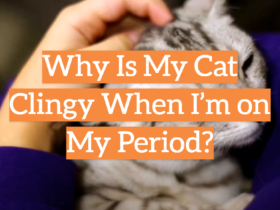



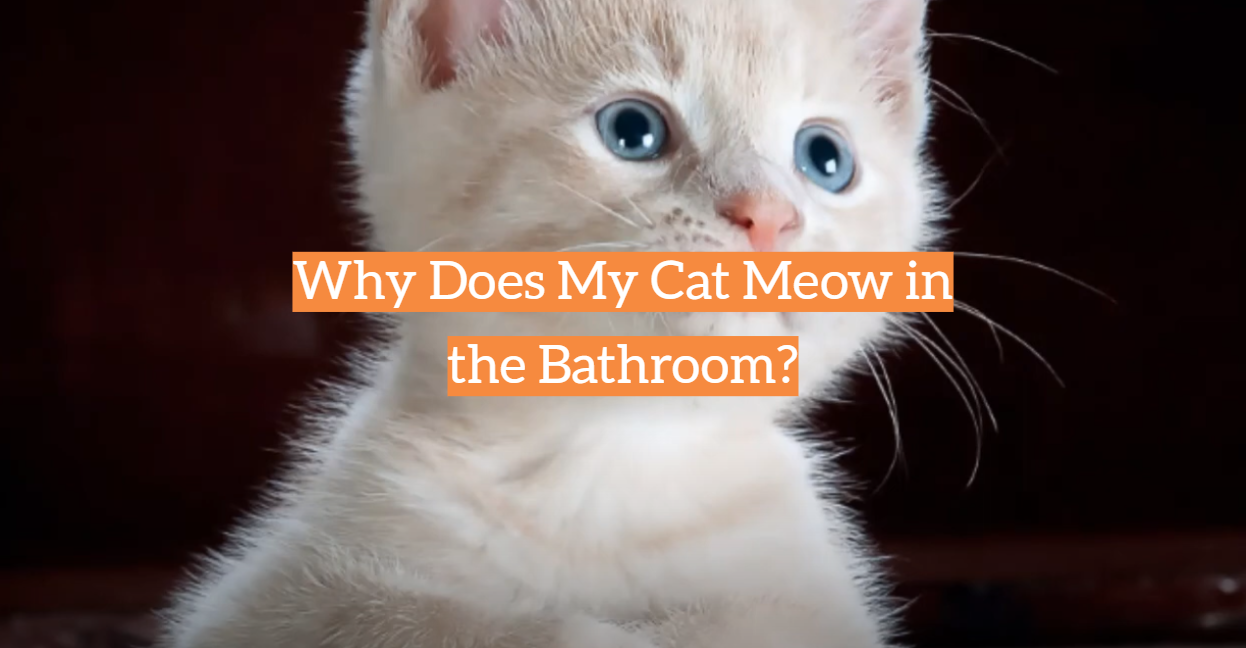



Leave a Reply